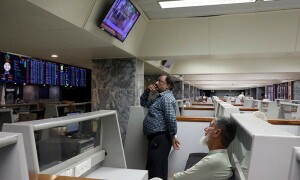DHAKA: Hundreds of thousands of Bangladeshi protesters demanding Prime Minister Sheikh Hasina resign, clashed with government supporters on Sunday, with dozens killed in one of the deadliest days since demonstrations began.
Rallies that began last month against civil service job quotas have escalated into some of the worst unrest of Hasina’s 15-year rule and shifted into wider calls for the 76-year-old to step down.
At least 91 people were killed on Sunday alone, including 14 police officers, with the rival sides battling with sticks and knives and security forces firing rifles, taking the total killed since protests began in July to at least 261.
Police said protesters attacked their officers, including storming a station in the town of Enayetpur.
“The terrorists attacked the police station and killed 11 policemen,” said Bijoy Basak, a deputy inspector general.
AFP journalists reported hearing sustained crackles of gunfire after dark on Sunday, with protesters defying a nationwide curfew.
Mobile internet was tightly restricted.
‘Final protest’
In several cases, soldiers and police did not intervene to stem the protests, unlike the past month of rallies that repeatedly ended in deadly crackdowns.
Demonstrators in the capital Dhaka, surrounded by a tightly packed and cheering crowd, waved a Bangladeshi flag on top of an armoured car as soldiers watched.
Asif Mahmud, one of the main leaders in the civil disobedience campaign, called on supporters to march on Dhaka on Monday. “Prepare bamboo sticks and liberate Bangladesh,” he wrote on Facebook on Sunday. “The time has come for the final protest,” he said.
Brought to justice
Vast crowds of protesters packed into Dhaka’s central Shahbagh Square on Sunday, with street battles in multiple sites.
“There were clashes between students and the ruling party men,” police inspector Al Helal said, adding two young men were killed in Dhaka’s Munshiganj district.
“One of the dead was hacked in his head and another had gunshot injuries.”
Another policeman, who asked not to be identified, said “the whole city has turned into a battleground”.
Two people were killed in the city of Kishioreganj, where protesters torched a ruling party office, police said.
Some former military officers have joined the student movement and ex-army chief Gen Ikbal Karim Bhuiyan turned his Facebook profile picture red in a show of support.
“We call on the incumbent government to withdraw the armed forces from the street immediately,” Bhuiyan told reporters on Sunday alongside other ex-officers, condemning “egregious killings, torture, disappearances and mass arrests”.
“Those who are responsible for pushing people of this country to a state of such an extreme misery will have to be brought to justice,” he said.
No longer about job quotas
Current army chief Waker-uz-Zaman told officers at the military headquarters in Dhaka on Saturday the “Bangladesh Army is the symbol of trust of the people”.
“It always stood by the people and will do so for the sake of people and in any need of the state,” he said, according to a statement, which did not say explicitly whether the army backed the protests.
The demonstrations have attracted people from all strata of Bangladesh society. Rap songs calling for people’s support have spread widely on social media.
“It is no longer about job quotas,” said Sakhawat, a young female protester who gave only one name, and called Hasina a “killer”.
A group of 47 manufacturers in the economically vital garment sector said they stood in “solidarity” with the protesters.
Obaidul Quader, general secretary of the ruling Awami League, has called on party activists to gather “in every district” nationwide to show their support for the government.
The unrest began in July over the reintroduction of the quota scheme, which reserved more than half of all government jobs for certain groups. It has since been scaled back by the country’s top court.
Published in Dawn, August 5th, 2024














































